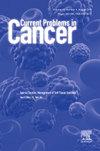阿特唑单抗、贝伐单抗、卡铂和紫杉醇治疗酪氨酸激酶抑制剂失效后表皮生长因子受体突变阳性的晚期非小细胞肺癌的疗效
IF 2.3
4区 医学
Q3 ONCOLOGY
引用次数: 0
摘要
具有驱动突变的非小细胞肺癌(NSCLC),特别是表皮生长因子受体(EGFR)或间变性淋巴瘤激酶,对免疫检查点抑制剂的敏感性降低。IMpower150在入组前对EGFR酪氨酸激酶抑制剂(EGFR- tki)耐药患者的亚组分析显示,阿特唑单抗、贝伐单抗、卡铂和紫杉醇(ABCP)治疗比贝伐单抗、卡铂和紫杉醇治疗的无进展生存期(PFS)更长。然而,由于探索性和小样本量,egfr - tki失败后ABCP的疗效仍存在争议。我们在有效性和毒性方面评估了ABCP治疗与其他无免疫检查点抑制剂的基于铂的方案的疗效。方法回顾性分析日本5家医院接受含铂化疗或ABCP治疗的egfr致敏突变晚期或复发性NSCLC患者的数据。倾向评分匹配比较了疗效结果,包括总有效率(ORR)、PFS和OS。结果183例EGFR突变携带者中,33例接受ABCP治疗,150例接受铂类化疗。根据倾向评分匹配,对32例和74例患者进行分析。在ABCP组中,中位PFS和OS分别为6.8和16.7个月,而铂基化疗组的中位PFS和OS分别为5.8和25.7个月,PFS (p = 0.46)和OS (p = 0.85)无显著差异。在肝转移中,相对于铂基化疗,ABCP的中位PFS为9.9个月vs 6.1个月,ORR为62.5% vs 35.7%,无统计学意义(PFS p = 0.16;ORR p = 0.70)。结论与铂基化疗相比,ABCP对EGFR-TKI失败后egfr -突变的NSCLC患者的疗效没有提高。本文章由计算机程序翻译,如有差异,请以英文原文为准。
Efficacy of atezolizumab, bevacizumab, carboplatin, and paclitaxel for epidermal growth factor receptor mutation-positive advanced non-small cell lung cancer after tyrosine kinase inhibitor failure
Background
Non-small cell lung cancer (NSCLC) with driver mutations, notably epidermal growth factor receptor (EGFR) or anaplastic lymphoma kinase, shows reduced sensitivity to immune checkpoint inhibitors. A subgroup analysis of the IMpower150 data on patients resistant to EGFR tyrosine kinase inhibitors (EGFR-TKI) before enrollment demonstrated prolonged progression-free survival (PFS) with atezolizumab, bevacizumab, carboplatin, and paclitaxel (ABCP) over bevacizumab, carboplatin, and paclitaxel. However, due to the exploratory nature and small sample size, the efficacy of ABCP post-EGFR-TKI failure is still debated. We evaluated ABCP therapy against other platinum-based regimens without immune checkpoint inhibitors in terms of effectiveness and toxicity.
Methods
Data from patients with advanced or recurrent NSCLC harboring EGFR-sensitizing mutations treated with platinum-based chemotherapy or ABCP at five Japanese hospitals were retrospectively analyzed. Propensity score matching compared efficacy outcomes, including overall response rate (ORR), PFS, and OS.
Results
Of 183 EGFR mutation carriers, 33 underwent ABCP therapy, while 150 received platinum-based chemotherapy. Following propensity score matching, 32 and 74 patients were analyzed. In the ABCP group, median PFS and OS were 6.8 and 16.7 months compared to 5.8 and 25.7 months with platinum-based chemotherapy, showing no significant differences in PFS (p = 0.46) and OS (p = 0.85). In liver metastases, ABCP yielded a median PFS of 9.9 versus 6.1 months and an ORR of 62.5 % versus 35.7 % relative to platinum-based chemotherapy, without statistical significance (PFS p = 0.16; ORR p = 0.70).
Conclusion
Compared with platinum-based chemotherapy, ABCP did not improve effectiveness in patients with EGFR-mutated NSCLC after EGFR-TKI failure.
求助全文
通过发布文献求助,成功后即可免费获取论文全文。
去求助
来源期刊

Current Problems in Cancer
医学-肿瘤学
CiteScore
5.10
自引率
0.00%
发文量
71
审稿时长
15 days
期刊介绍:
Current Problems in Cancer seeks to promote and disseminate innovative, transformative, and impactful data on patient-oriented cancer research and clinical care. Specifically, the journal''s scope is focused on reporting the results of well-designed cancer studies that influence/alter practice or identify new directions in clinical cancer research. These studies can include novel therapeutic approaches, new strategies for early diagnosis, cancer clinical trials, and supportive care, among others. Papers that focus solely on laboratory-based or basic science research are discouraged. The journal''s format also allows, on occasion, for a multi-faceted overview of a single topic via a curated selection of review articles, while also offering articles that present dynamic material that influences the oncology field.
 求助内容:
求助内容: 应助结果提醒方式:
应助结果提醒方式:


